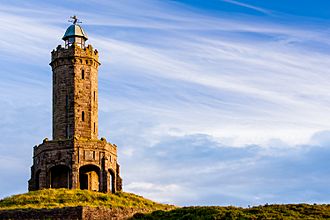Jubilee Tower facts for kids
Quick facts for kids Jubilee Tower |
|
|---|---|
 |
|
| General information | |
| Location | Darwen Hill |
| Town or city | Darwen, Lancashire |
| Country | England |
| Coordinates | 53°41′22.7″N 2°29′16.8″W / 53.689639°N 2.488000°W |
| Opened | 24 September 1898 |
| Height | 85 ft (26 m) |
The Jubilee Tower, often called Darwen Tower, stands tall on Darwen Hill in Lancashire, England. It was finished in 1898. This special tower was built to celebrate two important things: Queen Victoria's 60th year as queen (her Diamond Jubilee) and a big win for local people. They fought for and won the right to walk freely on the nearby moorland. The tower officially opened to the public on September 24, 1898. R. W. Smith-Saville was the architect who designed it.
The tower is about 85 feet (26 meters) high. Darwen Hill itself is 1,220 feet (372 meters) above sea level. If you climb to the top of the tower, you can see amazing views. On a clear day, you might spot places like North Yorkshire, Morecambe Bay, Blackpool Tower, Cumbria, the Isle of Man, North Wales, and Derbyshire.
Contents
Why Was Darwen Tower Built?
The Fight for Public Access
Long ago, people like packmen, farmers, and workers used paths across the moorland for their daily travels. But in the 1870s, the owner of the land, Reverend William Arthur Duckworth, blocked these old paths. He didn't want people walking on his land, even though he didn't live there. He wanted to protect his hunting rights, which were very valuable.
A man named William Thomas Ashton, who managed local coal mines, also used these moorland paths. He delivered coal to farmers. Whenever Duckworth's gamekeepers blocked his way, Ashton would clear the paths again. This disagreement eventually went to court.
A Victory for Local People
Reverend Duckworth lost the court case. This meant the local people had won their right to access the moorland. In September 1896, people celebrated by walking the paths again. William Thomas Ashton had passed away in 1884, so his sons led the celebration walk. The Jubilee Tower was built to remember this important victory for the community.
What Does Darwen Tower Look Like?
Inside the Tower
The tower has an octagonal shape. To reach the top, you first climb a stone spiral staircase. This takes you to the first level. From there, a smaller metal spiral staircase leads you all the way to the very top. It can be quite windy up there! Sometimes, mist below can hide the views.
Changes Over Time
The tower has changed a bit over the years. In 1947, a strong storm blew off the original wooden top part of the tower. It wasn't replaced until 1971. Local people helped raise money for a new top, which was made of fiberglass.
In October 2000, the tower was closed because it was thought to be unsafe. A study in 2001 found that the stone floor inside was badly damaged. Repairs took longer than expected, but the tower finally reopened on April 9, 2002.
A New Dome for the Tower
On November 11, 2010, strong winds blew off the fiberglass dome. A new, stronger dome was needed. It was made from powder-coated stainless steel by a local company, WEC Group of Darwen. This new dome cost over £35,000. On January 13, 2012, a helicopter carefully lifted the new dome into place, putting the finishing touch back on the Jubilee Tower.
Images for kids
 | Aaron Henry |
 | T. R. M. Howard |
 | Jesse Jackson |


